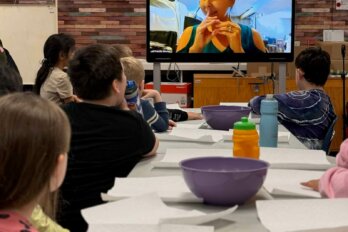Three young women, all seventeen, all nominated for this year’s Amazon First Novel Award Youth Short Story prize. And yet, their submissions are as unique as their individual trajectories.
For one, a curious fascination for abduction led to the creation of similarly evocative narrative. For another, the news cycle led her to zero in on characters with non-Western backgrounds. And for the third, a protracted struggle with obsessive-compulsive disorder led to the creation of a stylistically chaotic piece designed to encapsulate a state she’d found herself in many times, “Not to shame or over-simplify, but to simply understand.”
Having mined and mirrored their own lives in their nominated efforts, The Walrus asked each young woman to reflect on which stories—external or internal—they would most like to tell in future works.
I tend to be pretty impulsive about what I write, so I can’t say definitively what story I most want to tell. I’ve struggled with mental health in my life, so that’s always been a fairly common theme in my writing. I’ve [lived] with an eating disorder, which was sort of the focal point of my high school career and something that a lot of teen girls go through. Everyone can relate to growing up in a society where there’s a lot of fat-shaming—and body-shaming in general.
A collection of poems that touch on my own life experiences would make the most sense. Poetry tends to do away with a lot of the formalities of prose. I like how you can use language in an honest, visceral way, rather than having to [micromanage] your grammar. It can tap into your stream of consciousness, much like the emotional side of mental health. Maybe I’ll do that in my university years.
With things that are personal to me, I don’t tend to want to overdo it or write more than I need to. There’s a lot of frivolity associated with poetry, but in that format I can get at the heart of things.
– Cate Freeborn, winner of the Youth Short Story Category, “74 percent of the victims of non-family abductions are girls”
I would love to write about historically sidelined cultures and underrepresented demographics, be it through a fictitious or nonfiction lens. There is so much to learn from other cultures, and reading the stories of people from different regions of the world—about their language, their rituals, their food, the way they form their relationships and live their lives—can expand our own scope of empathy and consciousness.
When I write, my main goal is to reach a greater state of understanding, so elevating the experiences of those who are underrepresented, understanding their stories, and bringing their collective histories to light is incredibly satisfying.
– Nazanin Soghrati, “Bibi & Me”
As I contemplate whether I have a specific kind of story I would like to write, I cannot come up with an answer. I don’t know my intention going into the creative eye of the hurricane—I just write until I feel full. What I’m left with, more often than not, is a mush of thoughts that I eventually groan at. Yet, in the immediate aftermath, I feel proud enough of my efforts to let others see my work, because the one spectacular quality of anxious writing is that the truth seeps out the sides involuntarily.
So, while I can’t tell you whether I want to write romance, fantasy, or my autobiography, I can tell you that I want to write a story that is true to its core. Yes, the characters are fictional and the grapes are just props, but my intention, my depiction of the human condition, and my understanding of the complexities of this world and any other should be empathetically represented in letters and punctuation. I think being almost painfully honest with the reader is what makes for good writing. I don’t think I am capable of that just yet, but hopefully one day I will be.
– Yaani Dinu Mahapatuna, “Remnants of an Orange”





